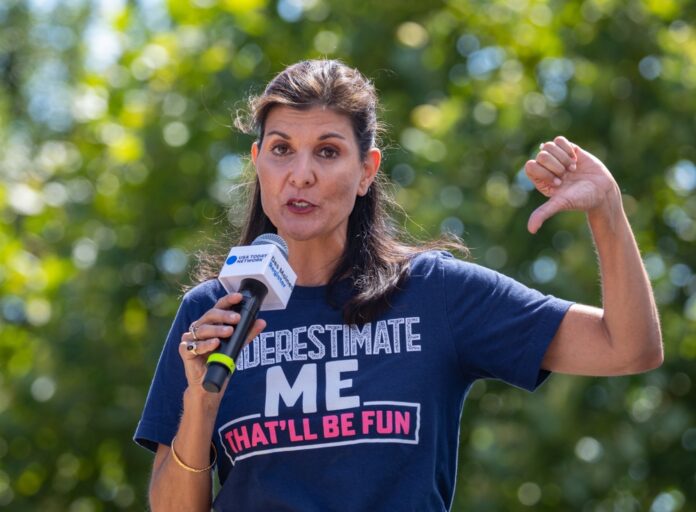
Nikki Haley, the former South Carolina governor and the last challenger to Donald Trump in the Republican presidential primary, had a memorable setback in Nevada on Tuesday. She ended up in second place behind “none of these candidates” in a state-run primary that didn’t grant any delegates or impact the nomination race.
Despite being the only candidate listed on the ballot, Haley suffered a resounding defeat in Nevada’s primary. She secured just 31% of the vote, far behind the 63% who opted for “none of these candidates,” according to Nevada election officials. Since no delegates were at stake, Haley’s loss was more symbolic than significant.
Nevada recognizes primaries and caucuses to select presidential candidates for the 2024 election, each with distinct procedures, dates, and ramifications. The primary, a state-administered election held on February 6, 2024, allowed all registered voters to participate via mail-in or in-person voting. Voters selected candidates from a ballot, with results determining the allocation of delegates for the Democratic National Convention, where the party’s nominee will be decided.
Additionally, the primary served as a non-binding preference poll for the Republican Party, although it did not influence delegate allocation.
The caucuses, conducted by the parties and scheduled for February 8, 2024, are exclusive to registered party members who attend in person at local precincts. Participants engage in multiple rounds of voting, expressing support for a candidate or “none of these candidates.” Given the Republican Party’s decision to disregard the primary results, the caucuses are the sole method for Republican candidates to secure Nevada delegates.
The introduction of primaries in Nevada resulted from a state law amendment following the 2020 election. The amendment transitioned Nevada from a caucus system to a primary system, perceived as more inclusive and representative for voters. However, it allowed parties to opt out of the primary and conduct caucuses, as the Republican Party chose to do. The Democratic Party, conversely, opted to retain the primary.
Both the primary and caucuses wield distinct impacts on the presidential race. The primary holds greater significance for Democratic candidates, offering delegate awards and reflecting the preferences of a broader and more diverse electorate. Conversely, the caucuses carry more weight for Republican candidates, reflecting the loyalty and enthusiasm of the party base through delegate allocation. Moreover, the primary and caucuses exhibit differing levels of competitiveness and predictability. The primary was anticipated to be a landslide victory for Joe Biden, facing no real competition in the Democratic arena. The caucuses are expected to yield a similar outcome for Donald Trump, encountering only one minor challenge, Haley, within the Republican field.
Given her lack of spending in the state, Haley’s campaign brushed off the result as expected. Yet, this lack of investment also applies to the 15 states voting on March 5. She criticized Nevada’s nominating process as “rigged” for Trump, who didn’t participate in the primary but is expected to win the party-run caucus later this week.
However, analysts suggested that Haley’s poor showing reflected her limited appeal among Republican voters, who remain loyal to Trump despite his controversies. Some Trump supporters in the state actively encouraged marking “none of these candidates” to protest Haley. Haley’s recent attacks on Trump might have put others off as she tries to position herself as his alternative.
Haley’s loss in Nevada was a significant blow for the former governor, who hasn’t won a state in the presidential primary yet. It also led to negative headlines and mockery from rivals and critics alike. Trump’s campaign labeled Haley’s Nevada performance as part of her “delusional tour” and suggested she should exit the race. Even Democrats joined in, with former Obama adviser David Axelrod poking fun at Haley’s absence from debating “None of these Candidates.”
Despite the setback, Haley vowed to continue her campaign, focusing on her home state of South Carolina, which votes on February 24, and Super Tuesday states on March 5. However, polls indicate she trails Trump by a wide margin nationally, including South Carolina.
While Haley’s Nevada loss won’t affect the delegate count, it tarnished her image and credibility as a presidential candidate. It underscored the difficulty of challenging Trump’s dominance in the GOP, even when he’s not on the ballot.
Haley may have lost to “none of these candidates” in Nevada, but she might soon discover she’s “none of these candidates” to most Republican voters.







